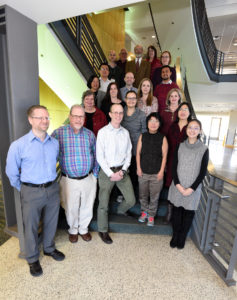Goal

Biostatistics Faculty and Staff
Our goal is to help improve the quality of research conducted at UAMS by providing expert statistical guidance to clinical, health services, and biomedical scientists. We strive to meet this goal:
- Through our collaborations with UAMS investigators
- Through our education and training endeavors
- Through our methodological research and
- By our service to the local and national research community.
Collaboration
Our collaborative efforts generally fall into one of three areas: protocol/grant development, data analysis, and manuscript preparation.
Protocol/Grant Development
We believe that well-designed studies are essential to successful research. Statisticians play a vital role in helping investigators design studies that address their scientific questions. Specific areas where statisticians are useful include ensuring that study objectives are clearly stated, proposing appropriate randomization procedures, clearly defining primary and secondary endpoints, proposing appropriate statistical analyses that address each research objective, and providing sample size estimates that ensure the study will have a high probability of meeting its objectives. Developing grants and protocols is a time consuming effort. We strongly encourage investigators to contact us as early as possible. For large, multi-project grants, we need to be involved at least four months (one NIH cycle) before the submission deadline. For less complex protocols, we require at least six weeks.
Data Analysis
UAMS biostatisticians possess the resources to complete even the most complex of analyses. The expertise of our faculty and staff represent many areas of the statistical sciences, including survey statistics, psychometrics, clinical trials, signal detection, and bioinformatics. This expertise is essential in determining the appropriate methods to use and in applying them properly. Just as important as the analyses is the ability to communicate the results in an understandable way. In addition to providing written reports, our statisticians discuss these results during one-on-one meetings with the investigators.
Manuscript Preparation
Our statisticians will assist in writing the manuscript when the study is ready for publication. In addition to providing succinct descriptions of the statistical methods, we can provide publication quality tables and graphics that help summarize the data. Co-authorship is expected on studies where substantive input on design or analysis is provided.
Education
Throughout the academic year, the Department of Biostatistics offers several courses through the College of Public Health and the UAMS Graduate School. These include Biostatistics I, II and III, Nonparametric Methods, Categorical Data Analysis, Clinical Trials, Survey Methods, and Application of Microcomputers to Data Management and Analysis. The College of Public Health also offers an MPH degree with a concentration in Biostatistics. In addition, Biostatistics faculty and staff participate in various educational venues through regular participation in journal clubs, seminar series and short courses related to their collaborative interests and involvement. They also guide and participate in preceptorship and integration project courses.
Methodological Research
When new problems arise out of data analysis or when existing methods are not adequate, our biostatisticians have the capability of developing new, more appropriate methods or creatively modifying and applying the existing ones, to meet the research needs and to contribute to our profession. Some of our recent research includes areas of non-parametric methodology, non-linear modeling, Bayesian methods and longitudinal data problems.
Service
The UAMS Department of Biostatistics is committed to improving research quality, as evidenced by our service to the local and national research communities. Locally, our faculty members are actively involved in research review committees, such as the Protocol Review and Monitoring Committee (PRMC) which reviews protocols involving the Winthrop P. Rockefeller Cancer Institute and the animal use committee (IACUC). Nationally, our faculty members serve frequently on NIH and PCORI review committees and Data Safety Monitoring Boards, and are active in the American Statistical Association and other professional organizations. Our members also actively participate in the publication peer review process and have recently reviewed manuscripts for a number of journals including Clinical Epidemiology, Comparative Effectiveness Research, International Journal of Women’s Health, PLOS ONE, Environmetrics, Journal of Statistical Computing, American Journal of Pharmacy, American Journal of Managed Care, Cancer, JAMA, Genetic Epidemiology, Dose Response, Journal of Statistical Computation and Simulation, Open Access Medical Statistics, Artificial Intelligence in Medicine, American Journal of Public Health, Journal of Statistical Education, Bioinformatics, and Lancet Oncology as well as numerous others.
